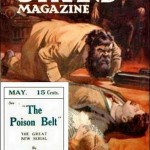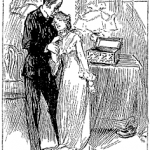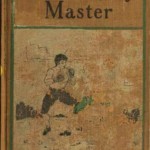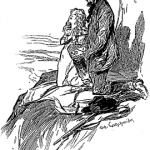“You are ill, dear,” the young lady cried. “Your mind is wandering. You have not even kissed me once.”
“No, and I don’t intend to either,” Von Hartmann said with decision. “You ought to be ashamed of yourself. Why don’t you go and fetch my slippers, and help your mother to dish the dinner?”
“And is it for this,” Elise cried, burying her face in her handkerchief — “is it for this that I have loved you passionately for upwards of ten months? Is it for this that I have braved my mother’s wrath? Oh, you have broken my heart; I am sure you have!” and she sobbed hysterically.
“I can’t stand much more of this,” roared Von Hartmann furiously. “What the deuce does the girl mean? What did I do ten months ago which inspired you with such a particular affection for me? If you are really so very fond, you would do better to run away down and find the schinken and some bread, instead of talking all this nonsense”
“Oh, my darling!” cried the unhappy maiden, throwing herself into the arms of what she imagined to be her lover, “you do but joke in order to frighten your little Elise.”
Now it chanced that at the moment of this unexpected embrace Von Hartmann was still leaning back against the end of the sofa, which, like much German furniture, was in a somewhat rickety condition. It also chanced that beneath this end of the sofa there stood a tank full of water in which the physiologist was conducting certain experiments upon the ova of fish, and which he kept in his drawing-room in order to insure an equable temperature. The additional weight of the maiden, combined with the impetus with which she hurled herself upon him, caused the precarious piece of furniture to give way, and the body of the unfortunate student was hurled backwards into the tank, in which his head and shoulders were firmly wedged, while his lower extremities flapped helplessly about in the air. This was the last straw. Extricating himself with some difficulty from his unpleasant position, Von Hartmann gave an inarticulate yell of fury, and dashing out of the room, in spite of the entreaties of Elise, he seized his hat and rushed off into the town, all dripping and dishevelled, with the intention of seeking in some inn the food and comfort which he could not find at home.
As the spirit of Von Baumgarten encased in the body of Von Hartmann strode down the winding pathway which led down to the little town, brooding angrily over his many wrongs, he became aware that an elderly man was approaching him who appeared to be in an advanced state of intoxication. Von Hartmann waited by the side of the road and watched this individual, who came stumbling along, reeling from one side of the road to the other, and singing a student song in a very husky and drunken voice. At first his interest was merely excited by the fact of seeing a man of so venerable an appearance in such a disgraceful condition, but as he approached nearer, he became convinced that he knew the other well, though he could not recall when or where he had met him. This impression became so strong with him, that when the stranger came abreast of him he stepped in front of him and took a good look at his features.
“Well, sonny,” said the drunken man, surveying Von Hartmann and swaying about in front of him, “where the Henker have I seen you before? I know you as well as I know myself. Who the deuce are you?”
“I am Professor von Baumgarten,” said the student. “May I ask who you are? I am strangely familiar with your features.”
“You should never tell lies, young man,” said the other. “You’re certainly not the Professor, for he is an ugly snuffy old chap, and you are a big broad-shouldered young fellow. As to myself, I am Fritz von Hartmann at your service.”
“That you certainly are not,” exclaimed the body of Von Hartmann. “You might very well be his father. But hullo, sir, are you aware that you are wearing my studs and my watch-chain?”
“Donnerwetter!” hiccoughed the other. ” If those are not the trousers for which my tailor is about to sue me, may I never taste beer again.”
Now as Von Hartmann, overwhelmed by the many strange things which had occurred to him that day, passed his hand over his forehead and cast his eyes downwards, he chanced to catch the reflection of his own face in a pool which the rain had left upon the road. To his utter astonishment he perceived that his face was that of a youth, that his dress was that of a fashionable young student, and that in every way he was the antithesis of the grave and scholarly figure in which his mind was wont to dwell. In an instant his active brain ran over the series of events which had occurred and sprang to the conclusion. He fairly reeled under the blow.
“Himmel!” he cried, “I see it all. Our souls are in the wrong bodies. I am you and you are I. My theory is proved — but at what an expense! Is the most scholarly mind in Europe to go about with this frivolous exterior? Oh the labours of a lifetime are ruined!” and he smote his breast in his despair.
“I say,” remarked the real Von Hartmann from the body of the Professor, “I quite see the force of your remarks, but don’t go knocking my body about like that. You received it in excellent condition, but I perceive that you have wet it and bruised it, and spilled snuff over my ruffled shirt-front.”
“It matters little,” the other said moodily. “Such as we are so must we stay. My theory is triumphantly proved, but the cost is terrible.”
“If I thought so,” said the spirit of the student, “it would be hard indeed. What could I do with these stiff old limbs, and how could I woo Elise and persuade her that I was not her father? No, thank Heaven, in spite of the beer which has upset me more than ever it could upset my real self, I can see a way out of it.”
“How?” gasped the Professor.
“Why, by repeating the experiment. Liberate our souls once more, and the chances are that they will find their way back into their respective bodies.”
No drowning man could clutch more eagerly at a straw than did Von Baumgarten’s spirit at this suggestion. In feverish haste he dragged his own frame to the side of the road and threw it into a mesmeric trance; he then extracted the crystal ball from the pocket, and managed to bring himself into the same condition.
Some students and peasants who chanced to pass during the next hour were much astonished to see the worthy Professor of Physiology and his favourite student both sitting upon a very muddy bank and both completely insensible. Before the hour was up quite a crowd had assembled, and they were discussing the advisability of sending for an ambulance to convey the pair to hospital, when the learned savant opened his eyes and gazed vacantly around him. For an instant he seemed to forget how he had come there, but next moment he astonished his audience by waving his skinny arms above his head and crying out in a voice of rapture, “Gott sei gedanket! I am myself again. I feel I am!” Nor was the amazement lessened when the student, springing to his feet, burst into the same cry, and the two performed a sort of pas de joie in the middle of the road.
For some time after that people had some suspicion of the sanity of both the actors in this strange episode. When the Professor published his experiences in the Medicalschrift as he had promised, he was met by an intimation, even from his colleagues, that he would do well to have his mind cared for, and that another such publication would certainly consign him to a madhouse. The student also found by experience that it was wisest to be silent about the matter.
When the worthy lecturer returned home that night he did not receive the cordial welcome which he might have looked for after his strange adventures. On the contrary, he was roundly upbraided by both his female relatives for smelling of drink and tobacco, and also for being absent while a young scapegrace invaded the house and insulted its occupants. It was long before the domestic atmosphere of the lecturer’s house resumed its normal quiet, and longer still before the genial face of Von Hartmann was seen beneath its roof. Perseverance, however, conquers every obstacle, and the student eventually succeeded in pacifying the enraged ladies and in establishing himself upon the old footing. He has now no longer any cause to fear the enmity of Madame, for he is Hauptmann von Hartmann of the Emperor’s own Uhlans, and his loving wife Elise has already presented him with two little Uhlans as a visible sign and token of her affection.






